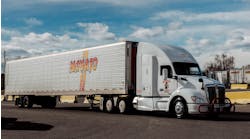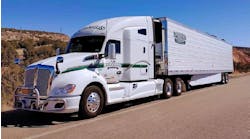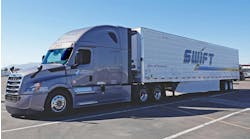KLLM Transport Services Inc has received two offers for purchase of the company. One was made April 12, 2000, by Low Acquisition Inc, which is wholly owned by Robert E Low of Springfield MO. Low has offered to purchase all outstanding shares of common stock, par value $1 per share, of KLLM not owned by Low or its affiliates at a price of $7.75 per share.
The other offer was made by Jack Liles, chairman, president, and chief executive officer of KLLM; and Bernard Ebbers. The two propose to acquire all of the outstanding shares of KLLM at a price of $8.25 per share in cash.
Both offers are under consideration by KLLM, acting through a special committee of the board of directors consisting of independent KLLM directors.
Acceptance of the Liles-Ebbers offer would create a default under KLLM's existing revolving credit facility. Therefore, Liles and Ebbers have delivered to KLLM's board a commitment letter executed by Bank of America NA to refinance KLLM's existing revolving credit facility upon acceptance of the offer. Ebbers would finance the purchase price of KLLM's shares, subject to negotiation of a definitive refinancing agreement.
Frozen Food Express Tallies Quarterly Results Frozen Food Express Industries Inc, which previously announced that it would restructure its operations during 2000, has reported first-quarter operating results that, according to the company's chairman, were "better than we expected."
Revenue for the quarter was $92,416,000, compared with $88,257,000 for first-quarter 1999. The company reported a loss of $563,000 for the 2000 quarter, compared with net income of $1,263,000 for first-quarter 1999.
The 2000 quarter also reflected improvement over fourth-quarter 1999, for which the Dallas TX-based company reported a loss of $13,544,000 on revenue of $89,903,000.
Mesilla Valley Orders 150 Volvo 660 Tractors Mesilla Valley Transportation Inc in southeastern New Mexico has entered an agreement to purchase 150 Volvo 660 tractors to be delivered over a two-year period beginning in April 2000. This 250-unit refrigerated and general freight carrier had purchased its first eight Volvo 610s in 1998 for evaluation. All 150 tractors will be equipped with Cummins N14-430 engines and Eaton Autoshift transmissions.
AFFI Opposes Changes to Citizen Petition Rules In written comments submitted to the United States Food and Drug Administration (FDA), the American Frozen Food Institute (AFFI) voiced opposition to the agency's proposed revisions to current citizen petition rules, stating that the changes would suppress feedback on pertinent issues and stifle innovation in the food industry.
Under the proposed revisions, published November 30, 1999, in the Federal Register, FDA would give a "brief denial" of all petitions deemed to be without public health significance. Included on its list of such denials would be requests by the food industry to approve standards of identity for food products. Without such FDA standards, frozen food companies would be unable to test-market new products that differ from the accepted standard of identity.
The AFFI supports measures that enable the agency to use its resources more efficiently. However, AFFI believes this latest proposal will do little to further that goal. If the rule is enacted, it would not decrease the number of frivolous petitions filed, but only limit the number of issues which FDA takes under serious consideration. AFFI recommended that instead of proposing changes to a largely successful system, FDA should increase its efficiency more carefully through management changes and other internal modifications.
CTA Urges Meeting on Fuel Tax Reductions The Canadian Trucking Alliance (CTA) says it welcomes recent statements in Canada's House of Commons from federal finance minister, Paul Martin, that the federal government might reduce its excise taxes on fuel, as long as the provincial governments also reduce theirs.
However, the CTA cautions that the finance minister's comments, which were made during question period, do not appear to be a statement of government policy. Consequently, the truckers want Martin to demonstrate the federal government's seriousness by calling an early meeting with his provincial counterparts on the issue.
David Bradley, CTA chief executive officer, has written a letter to Martin urging him to confirm that diesel fuel taxes as well as gasoline taxes are on the table and "to pursue this strategy with haste."
"Trucks haul some 90 percent of consumer goods and foodstuffs and carry 70 percent trade with the United States," said Bradley. "With fuel being the second-largest component of motor carrier costs (sometimes up to 30 percent of operating costs) and the largest component of cost for independent owner-operators, the continuing impact of high fuel prices on Canadian competitiveness and the overall economy could be profound. This is compounded by the fact that not only do the combined federal-provincial fuel taxes further inflate the cost of fuel, but they are also profit-insensitive."
Cal/OSHA Issues Alert on Ethylene Gas Use The California Division of Occupational Safety and Health (Cal/OSHA) has issued an alert informing employers of steps to prevent injury or death from use of ethylene gas in the produce-ripening industry. Ethylene gas is used to ripen fruit such as apples, bananas, and berries.
In a recent accident at Pan American Banana Co in Los Angeles CA, one employee was fatally injured and another critically injured by an explosion that occurred inside a tightly enclosed room where ethylene gas was being used to ripen fruit. Five other employees were injured in the blast.
These precautions should be observed:
* Only experienced workers should be permitted to use ethylene gas-ripening equipment.
* Use ethylene gas and related equipment in accordance with manufacturer instructions and applicable Title 8 safety orders - such as Section 5194, Hazard Communication; or Section 5189, Process Safety Management. Title 8 of the California Code of Regulations covers all Cal/OSHA workplace safety and health requirements.
* Train employees to recognize and report unsafe conditions in their immediate work environment.
* Electrically ground all equipment when using ethylene gas.
* Keep ethylene gas away from flames, sparks, or other sources of ignition.
The California Department of Industrial Relations web site at www.dir.ca.gov/ DOSH/dosh1.html has a copy of the alert.
DOT Unveils Proposed HOS Revisions United States Secretary of Transportation Rodney E Slater helped unveil proposed revisions to the hours of service regulations governing the trucking industry, with plans to have concrete changes to HOS rules in place by the end of 2000.
Key parts of the proposed HOS revisions also may alter the way the trucking industry operates, though Slater hopes they will not create a negative impact.
"We understand how important the trucking industry is in this country, but this is not just an issue of productivity," he said at press conference at DOT headquarters in Washington DC. "We have the obligation to the American people to have the safest transportation system in the world."
Proposed by the Federal Motor Carrier Safety Administration, HOS revisions include:
* All drivers now will function on a 24-hour daily cycle instead of the 18-hour cycle in the current HOS regulations.
* There will be no difference between "on-duty driving" and "on-duty-not driving" anymore.
* Instead of 10 hours of driving and 15 hours of on-duty time allowed by the current HOS rules, the proposed revisions will limit drivers to 12 hours on-duty time to drive.
* Instead of a one-size-fits-all-approach, proposed HOS revisions cover five driving applications-long-haul, regional, local-split shift, local, and work vehicle-with flexible HOS rules in some categories.
* Electronic onboard recording devices (EOBRs) will be mandated for long-haul and regional truckers once the final rule goes into effect. Companies with more than 50 trucks will have two years to install EOBRs; companies with between 21 and 50 trucks, three years; and companies with less than 21 trucks, four years.
The EOBRs are intended to replace and eliminate paper logs, said Julie Cirillo, acting FMCSA deputy administrator. However, truckers who do not install EOBRs will not be allowed to function under the proposed HOS revisions, she said. This means they will be limited to 10 hours of on-duty driving time.
FMCSA estimates the proposed HOS revisions will cost the trucking industry $3.4 billion over the next 10 years, including the $500 estimated cost to install EOBRs. However, FMCSA also estimates the proposed changes will help prevent 2,600 crashes, 115 fatalities, and some 3,000 injuries in the same period-a savings of $6.8 billion.
The public will have 90 days to comment upon the proposed revisions, with hearings scheduled in: Atlanta GA, Denver CO, Indianapolis IN, Kansas City MO, Los Angeles CA, Springfield MA, and Washington DC. However, both DOT and FMCSA are intent on publishing a final HOS rule by the end of 2000, so the 90-day comment period will not be extended, said Cirillo.
Thermo King Acquires Zexel Cold Systems Thermo King Corp has acquired controlling interest in Zexel Cold Systems. Based in Tokyo, Japan, Zexel manufactures bus air-conditioning equipment and small truck refrigeration systems. Zexel employs 120 people and has an estimated $50 million in annual sales. Thermo King, through parent company Ingersoll-Rand, has purchased 70 percent of the company. Thermo King, as well as Zexel, will become part of Ingersoll-Rand's newly formed Climate Control Sector.
Along with a manufacturing facility in Shenzhen, China, Thermo King has 67 dealerships in Asia.
EPA Issues Anhydrous Ammonia Theft Alert The Environmental Protection Agency (EPA) has issued a chemical accident alert because a number of anhydrous ammonia thefts have resulted in chemical releases from agricultural product dealers and facilities with ammonia refrigeration systems. The accidents have occurred because: valves were left open after anhydrous ammonia was siphoned off, locks were sawed or broken, anhydrous ammonia was transferred inappropriately into makeshift containers, plugs were removed from anhydrous ammonia lines at refrigeration facilities, or the wrong hose and/or fittings were attached to storage containers.
Anhydrous ammonia is used as an agricultural fertilizer and industrial refrigerant. It is also used in the illegal production of methamphetamines. Illegal drug makers often steal anhydrous ammonia from areas where it is stored and used. Anhydrous ammonia can be harmful to people who come in contact with it or inhale airborne concentrations of the gas. When stolen, the toxic gas can be released unintentionally, causing injuries.
The chemical alert provides tips to deter anhydrous ammonia theft. For a copy of the alert, access EPA's web page at www.epa.gov/ceppo or phone-800-424-9346 or 703-412-9810.


